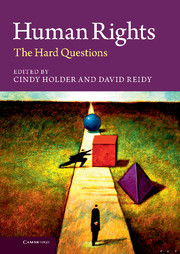Book contents
- Frontmatter
- Contents
- Figure
- List of table
- Notes on contributors
- Introduction
- Part I What are human rights?
- Part II How do human rights relate to group rights and culture?
- Part III What do human rights require of the global economy?
- 8 What do human rights require of the global economy?
- 9 Universal human rights in the global political economy
- 10 Human rights and global equal opportunity
- Part IV How do human rights relate to environmental policy?
- Part V Is there a human right to democracy?
- Part VI What are the limits of rights enforcement?
- Part VII Are human rights progressive?
- Index
- References
8 - What do human rights require of the global economy?
Beyond a narrow legal view
Published online by Cambridge University Press: 05 May 2013
- Frontmatter
- Contents
- Figure
- List of table
- Notes on contributors
- Introduction
- Part I What are human rights?
- Part II How do human rights relate to group rights and culture?
- Part III What do human rights require of the global economy?
- 8 What do human rights require of the global economy?
- 9 Universal human rights in the global political economy
- 10 Human rights and global equal opportunity
- Part IV How do human rights relate to environmental policy?
- Part V Is there a human right to democracy?
- Part VI What are the limits of rights enforcement?
- Part VII Are human rights progressive?
- Index
- References
Summary
Introduction
Economic activity, like any area of life, affects individual human beings, and therefore potentially impacts human rights, both positively and negatively. Direct impacts can be on a very small, individual basis, such as the improved livelihood one person receives as a result of his or her employment, or alternatively, the harm he or she suffers from poor work practices, discrimination or exposure to dangerous materials. They can also be on an enormous scale, such as when thousands of people are forcibly evicted to make way for a new infrastructure project, or when a waterway is severely polluted. Less directly, decisions and policies in the economic arena can affect human rights in a systemic manner, such as the impact on livelihoods of limiting or increasing market access for agricultural exports as a result of trade rules, or the impact of austerity measures required by international financial institutions as a lending condition.
Human rights as a concept holds that there are certain entitlements that are intrinsic to being human. These rights and their origins are chronicled extensively in other chapters in this volume. In the language of international human rights law, these intrinsic entitlements are said to derive from inherent human dignity (UDHR, Preamble paras. 1 and 5 and Article 1; United Nations Charter 1945, Preamble para. 2; World Conference on Human Rights, Preamble paras. 2 and 5 and Articles 11, 18, 20, 25 and 55). Any action that infringes those entitlements will therefore be illegitimate and amount to a breach of human rights, in the non-legal sense. Furthermore, the full realization of human rights for all humankind can require positive steps to be undertaken, at least where states are concerned, given the purpose of the state in governing for the benefit of its people.
- Type
- Chapter
- Information
- Human RightsThe Hard Questions, pp. 153 - 173Publisher: Cambridge University PressPrint publication year: 2013
References
- 2
- Cited by

